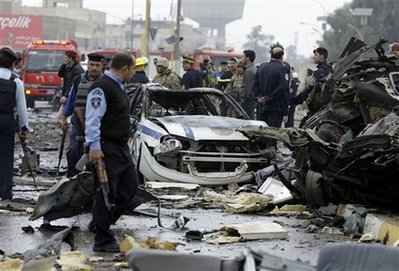Global General
Wave of coordinated attacks in Iraq kills 127
(Agencies)
Updated: 2009-12-09 06:53
|
|
BAGHDAD: A suicide car bomb flattened a court building and an explosives-rigged ambulance blew down walls like dominos near the Finance Ministry during a wave of coordinated attacks Tuesday that targeted high-profile symbols of Iraqi authority. At least 127 people were killed.
The blasts -- at least five in total -- marked the third major strike on government sites since August and brought uncomfortable questions for Iraqi leaders. These include signs al-Qaida in Iraq is regrouping and concerns over the readiness of Iraqi forces to handle security alone as US forces depart.
The bombings also brought swift accusations about the motives behind the attacks. Officials claimed a Sunni insurgent alliance, including members of Saddam Hussein's banned Baath Party, seeks to undermine the pro-Western government ahead of elections set for March 7 and the later withdrawal of US combat forces.
"If security falls apart, then everything will collapse," said Abbas al-Bayati, head of parliament's defense committee and an ally of the Shiite government, as lawmakers convened an emergency session.
Another lawmaker, Saadi al-Barazanji, shouted: "If I were the interior minister, I would resign!"
The attacks began with a suicide strike on a police patrol. An hour later, four more explosions rumbled across Baghdad in the span of a few minutes. Suicide car bombings hit three sites: the main Appeals Court, an area outside the Finance Ministry and a government compound that includes the Labor Ministry. A roadside bomb also went off near a university.
Iraq's Health Ministry reported at least 513 people were wounded.
There was no immediate claim of responsibility. However, multiple bombings are a hallmark of al-Qaida. The past two major strikes on Iraqi government sites were coordinated blasts in August and October that took more than 255 lives. Sunni groups linked to al-Qaida eventually issued statements saying they carried out the attacks.
Iraq's government, however, has tried to cast blame on Saddam loyalists -- even parading three suspects on national television who gave what officials termed confessions for the October attacks.
No independent evidence has emerged to support a possible resurgence of the militant Baath Party cells. Instead, the government allegations are seen as attempts to deflect suspicions that al-Qaida and its insurgent allies could be regrouping before the March elections and the withdrawal of US combat forces at the end of August.
Prime Minister Nouri al-Maliki's government has pointed to the sharp drop in overall violence around Iraq as one of its main achievements going into the elections. Any hints of instability could cost them at the polls.
Just hours after the bombings, the government set March 7 as the date for parliamentary elections. The voting was delayed by nearly seven weeks because of bickering over election rules. The postponement -- coupled with any upsurge in violence -- could complicate the Pentagon's pullout timetable as pressure builds to shift troops and equipment to Afghanistan.












